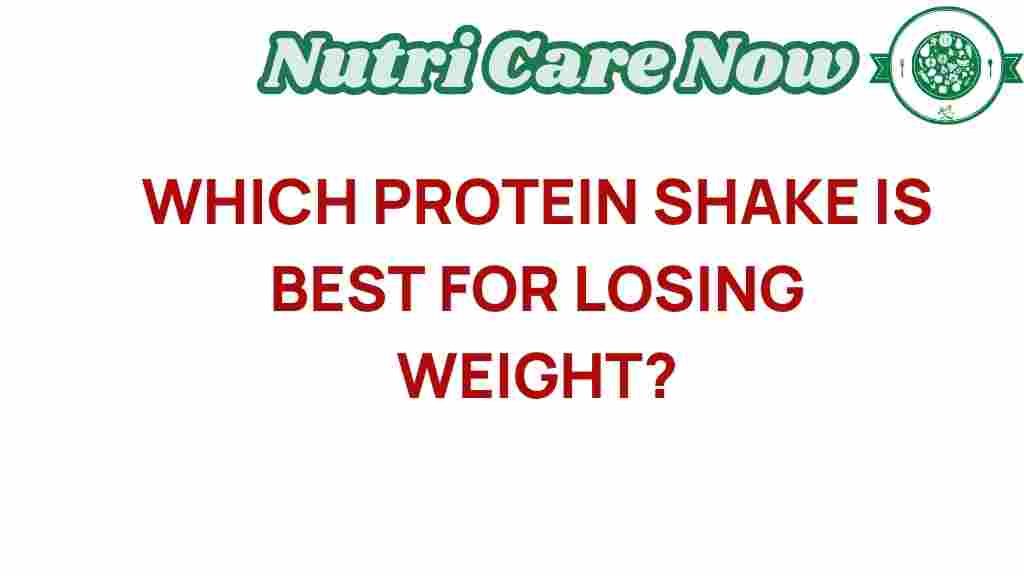Unlocking the Secrets: Which Protein Shake is Best for Weight Loss?
In the quest for effective weight loss, many individuals turn to protein shakes as a convenient and nutritious option. With the growing popularity of fitness and health trends, it’s essential to understand which protein shake is best for weight loss. In this article, we will explore the various types of protein shakes, their nutritional benefits, and how they can fit into a healthy diet. We’ll also provide tips for choosing the right shake and how to incorporate it into your meal plan effectively.
Understanding Protein Shakes
Protein shakes are beverages made by mixing protein powder with water, milk, or other liquids. They serve multiple purposes, from meal replacement to post-workout recovery. When considering protein shakes for weight loss, it’s crucial to choose ones that align with your nutritional goals. Here are some key points about protein shakes:
- Protein Source: Common sources include whey protein, casein, soy, pea, and rice protein. Each has its own benefits and amino acid profiles.
- Calories: Pay attention to the calorie content, as some shakes can be high in calories and sugar, which can hinder weight loss.
- Meal Replacement: Some protein shakes can serve as meal replacements, providing essential nutrients while keeping you full.
Types of Protein Shakes
When it comes to protein shakes, there are primarily two categories: whey protein and plant-based protein.
Whey Protein
Whey protein is derived from milk and is one of the most popular protein supplements. Here are its pros and cons:
- Pros:
- High in essential amino acids.
- Quick absorption rate, making it ideal for post-workout recovery.
- Supports muscle growth and repair.
- Cons:
- May cause digestive issues for lactose intolerant individuals.
- Not suitable for vegans.
Plant-Based Protein
Plant-based protein shakes are made from sources such as peas, soy, hemp, and brown rice. They are a great alternative for those who prefer vegan options. Here are the benefits:
- Pros:
- Generally easier to digest for those with lactose intolerance.
- Rich in fiber, which aids in digestion and satiety.
- Suitable for vegans and individuals with dietary restrictions.
- Cons:
- May be lower in certain essential amino acids compared to whey protein.
- Some blends can be gritty or have an unusual taste.
Choosing the Right Protein Shake for Weight Loss
With so many options available, how do you choose the best protein shake for weight loss? Here are some steps to guide you:
1. Check the Ingredients
Look for shakes with minimal ingredients. Avoid those with added sugars, artificial flavors, and preservatives. A clean label can often indicate a healthier product.
2. Consider the Protein Content
Choose a shake that provides at least 15-30 grams of protein per serving. Higher protein content can help promote satiety, making it easier to stick to a calorie-controlled diet.
3. Monitor the Calories
For weight loss, it’s crucial to keep track of your calorie intake. Opt for shakes that are around 100-200 calories per serving, especially if you intend to use them as meal replacements.
4. Look for Added Nutrients
Some protein shakes are fortified with vitamins and minerals, fiber, and healthy fats. These can enhance the nutritional value of your shake and contribute to overall health.
5. Taste and Texture
Make sure to choose a shake that you enjoy. If you don’t like the taste, you’re less likely to stick with it. Read reviews and consider trying sample packs before committing to a larger container.
Incorporating Protein Shakes into Your Diet
Once you’ve chosen your ideal protein shake for weight loss, here are some tips on how to incorporate it into your diet:
- Meal Replacement: Use a protein shake as a meal replacement for breakfast or lunch. Combine it with fruits or greens to make a smoothie.
- Post-Workout Recovery: Drink a protein shake within 30 minutes post-workout to support muscle recovery.
- Snack Option: If you’re feeling hungry between meals, a protein shake can be a satisfying and nutritious snack.
Common Mistakes to Avoid
While protein shakes can be an excellent addition to your weight loss strategy, there are common pitfalls to avoid:
- Overconsumption: Just because a shake is healthy doesn’t mean you can drink it in excess. Keep track of your overall protein intake to avoid exceeding your needs.
- Ignoring Calories: Some shakes can be high in calories if you add other ingredients like nut butter or full-fat milk. Be mindful of your total calorie intake.
- Relying Solely on Shakes: While protein shakes can be beneficial, they should not replace whole foods entirely. Aim for a balanced diet rich in fruits, vegetables, whole grains, and lean proteins.
Conclusion
In summary, protein shakes can be a valuable tool in your weight loss journey when chosen and used correctly. Whether you opt for whey protein or plant-based protein, ensure that it fits your dietary needs and preferences. By monitoring your calorie intake, paying attention to ingredients, and incorporating shakes thoughtfully into your diet, you can unlock the secrets to effective weight loss.
For more information on nutrition and weight loss strategies, check out this nutrition guide. Remember, the key to successful weight loss lies in a balanced approach that includes exercise, proper nutrition, and a sustainable eating plan.
Ready to start your weight loss journey? Find the perfect protein shake that suits your lifestyle and taste preferences, and watch as it complements your fitness goals!
This article is in the category Supplements and created by NutriCareNow Team
